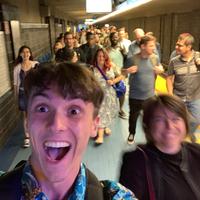地铁 广播
Subway announcement|announcement
地下鉄|
Metro-Rundfunk
subway radio
diffusion métropolitaine
メトロ放送
transmissão metropolitana
旅客 们 :
passengers|
欢迎您 乘坐 北京地铁 十号 线 。
|Take the subway|||Line 1
ようこそ||北京地下鉄||
Welcome to Beijing Subway Line 10.
现在 是 乘车 高峰期 , 车站 内人 多 拥挤 。
|||peak hour||||crowded
|||ピーク時||人||
It's rush hour now, and the station is crowded.
请 您 看管 好 自己 的 行李物品 。
||見守って||||
Please take care of your luggage.
请 站 在 黄色 安全线 内 候车 。
|stand||yellow|||wait for the bus
||||安全線||待機
Please stand inside the yellow security line and wait for the bus.
列车 进站 后 , 请 先下 后 上 , 主动 把 座位 让给 老弱病残孕 以及 有 需要 的 人 。
|||||||take initiative||seat 1|||||||
列車|到着|||先に降りて||||||譲って|高齢者障|||||
After the train enters the station, please get off first and then get on, and take the initiative to give up your seats to the elderly, weak, sick, disabled, pregnant and people in need.
谢谢您 的 合作 !
||ご協力
Thank you for your cooperation!
词语 :
第一个 单词 " 高峰期 ", 指 的 是 " 人流量 、 车流量 、 交易量 非常 多 的 某个 时段 "。
|||||||traffic volume||||||peak period
|単語|||||人の流れ|車の流れ|取引量|||||時間帯
例如 : 北京 的 交通 高峰期 通常 是 上午 七点 到 九点 , 下午 五点 到 七点 。
||||peak hours||||||||||
Example: Beijing's peak traffic hours are usually from 7:00 am to 9:00 am and from 5:00 pm to 7:00 pm.
再 例如 : 千万别 在 八点 出门 , 那 时候 是 交通 高峰期 , 容易 堵车 。
||must not|||||||||easy to get stuck|
||絶対に||||||||||
Another example: Don't go out at 8 o'clock, because it is the rush hour of traffic at that time, and it is easy to get stuck in traffic.
请 听课 文中 的 句子 : 现在 是 乘车 高峰期 , 车站 内人 多 拥挤 。
Please listen to the sentences in the text: Now is the rush hour, and the station is crowded with people.
第二个 单词 " 看管 ", 意思 是 " 照看 管理 "。
||||||管理
The second word, "caretaker", means "to look after management".
这里 的 " 看 " 读 第一声 ,kān。
||||第一声|見る
Here "watch" reads the first sound, kān.
例如 :" 带 小孩 的 乘客 请 看管 好 自己 的 小孩 。
||||passenger with child||||||
For example: "Passengers with children, please take care of your children.
再 例如 :" 我 下周 要 去 北京 出差 , 我 拜托 邻居 看管 我家 的 小狗 。
|||||||||ask for help|||||
||||||||||||||子犬
Another example: "I'm going on a business trip to Beijing next week, and I ask my neighbor to take care of my puppy.
请 听课 文中 的 句子 : 请 您 看管 好 自己 的 行李物品 。
Please listen to the sentences in the text: Please take good care of your luggage.
第三个 单词 " 主动 ", 意思 是 " 在 没有 外界 要求 的 情况 下 , 自愿地 做 某事 "。
||||||||||situation 1||||
|||||||外部の|||||自発的に||何か
The third word "active" means "to do something voluntarily without external demands".
例如 : 这 是 她 第一次 主动 向 我 道歉 。
||||||||apologize
Example: This is the first time she has offered to apologize to me.
再 例如 : 小李 主动 帮 我 拿 箱子 。
||Xiao Li|||||
|||||||箱
Another example: Xiao Li offered to help me carry the box.
请 听课 文中 的 句子 : 列车 进站 后 , 请 先下 后 上 , 主动 把 座位 让给 老弱病残孕 以及 有 需要 的 人 。
Please listen to the sentences in the text: After the train enters the station, please get off first and then get on, and take the initiative to give up your seats to the elderly, weak, sick, disabled, pregnant and people in need.
第四个 单词 " 老弱病残孕 " 这 是 对 五种 人 的 简称 ," 老人 、 弱小 的 人 , 通常 指 的 是 孩子 、 病人 、 残疾人 和 孕妇 "。
||the elderly children patients disabled pregnant women|||||||abbreviation|||||usually|||||patients|disabled people||pregnant women
||||||五つの|||||弱い|||||||||障害者||妊婦
The fourth word "old, weak, sick, disabled and pregnant" is an abbreviation for the five types of people, "the old, the weak, usually referring to children, sick people, disabled people and pregnant women".
例如 ," 你 怎么 好意思 坐在 老弱病残孕 专座 上 ?
||||priority seat|||
|||恥ずかしく|||優先席|
For example, "Why do you have the nerve to sit in the special seat for the elderly, weak, sick, disabled and pregnant?
再 例如 ," 黄色 座椅 是 老弱病残孕 专用 座椅 。
|||座席|||専用|
Another example, "The yellow seat is a special seat for the elderly, the weak, the sick, the disabled, and pregnant women.
请 听课 文中 的 句子 :" 列车 进站 后 , 请 先下 后 上 , 主动 把 座位 让给 老弱病残孕 以及 有 需要 的 人 。
Please listen to the sentence in the text: "After the train enters the station, please get off first and then get on, and take the initiative to give up your seats to the elderly, weak, sick, disabled, pregnant and those in need.
下面 让 我们 再 听 一遍 课文 :
Let's listen to the text again:
旅客 们 :
Travelers:
欢迎您 乘坐 北京地铁 十号 线 。
现在 是 乘车 高峰期 , 车站 内人 多 拥挤 。
请 您 看管 好 自己 的 行李物品 。
请 站 在 黄色 安全线 内 候车 。
列车 进站 后 , 请 先下 后 上 , 主动 把 座位 让给 老弱病残孕 以及 有 需要 的 人 。
谢谢您 的 合作 !

